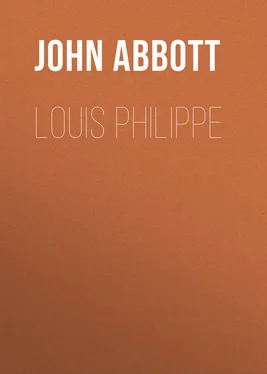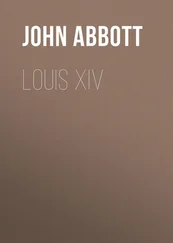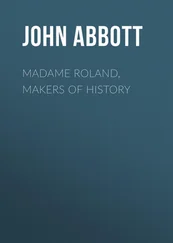John Abbott - Louis Philippe
Здесь есть возможность читать онлайн «John Abbott - Louis Philippe» — ознакомительный отрывок электронной книги совершенно бесплатно, а после прочтения отрывка купить полную версию. В некоторых случаях можно слушать аудио, скачать через торрент в формате fb2 и присутствует краткое содержание. ISBN: , Жанр: foreign_antique, foreign_prose, Историческая проза, на английском языке. Описание произведения, (предисловие) а так же отзывы посетителей доступны на портале библиотеки ЛибКат.
- Название:Louis Philippe
- Автор:
- Жанр:
- Год:неизвестен
- ISBN:http://www.gutenberg.org/ebooks/28199
- Рейтинг книги:5 / 5. Голосов: 1
-
Избранное:Добавить в избранное
- Отзывы:
-
Ваша оценка:
- 100
- 1
- 2
- 3
- 4
- 5
Louis Philippe: краткое содержание, описание и аннотация
Предлагаем к чтению аннотацию, описание, краткое содержание или предисловие (зависит от того, что написал сам автор книги «Louis Philippe»). Если вы не нашли необходимую информацию о книге — напишите в комментариях, мы постараемся отыскать её.
Louis Philippe — читать онлайн ознакомительный отрывок
Ниже представлен текст книги, разбитый по страницам. Система сохранения места последней прочитанной страницы, позволяет с удобством читать онлайн бесплатно книгу «Louis Philippe», без необходимости каждый раз заново искать на чём Вы остановились. Поставьте закладку, и сможете в любой момент перейти на страницу, на которой закончили чтение.
Интервал:
Закладка:
Execution of Egalité.
At the guillotine the executioner took off his coat, and was about to draw off his boots, when he said, calmly, "It is only loss of time; you will remove them more easily from my lifeless limbs." He examined the keen edge of the knife, and was bound to the plank. The slide fell, and his head dropped into the basket. Thus perished Louis Philippe Egalité in the 46th year of his age. It was the 6th of November, 1793, ten months after Louis XVI. had perished upon the same scaffold. The immoralities of the Duke of Orleans were such that it has often been said of him, "Nothing became his life so much as his manner of leaving it." Louis Philippe Egalité, inheriting from his ancestors vast opulence, had become, by his marriage with the daughter of the immensely wealthy Duke of Penthièvre, the possessor of almost royal domains. His wife, the duchess, though aristocratic in all her prepossessions, and sympathizing not at all with her husband in his democratic views, was a woman of unblemished character, of amiable disposition, and of devoted piety.
Having thus given a brief account of the origin of the Orleans family, we must, at the expense of a little repetition, turn back to the birth of Louis Philippe, the oldest son of the Duke of Orleans, and the subject of this memoir.
Birth of Louis Philippe.
Louis Philippe was born in the Palais Royal, in Paris, on the 6th of October, 1773. In his early years, he, with the other children of the ducal family, was placed under the care and tuition of the celebrated Madame de Genlis. Until the death of his father, he bore the title of the Duke of Chartres.
"The Duke of Chartres," writes Lamartine, "had no youth. Education suppressed this age in the pupils of Madame de Genlis. Reflection, study, premeditation of every thought and act, replaced nature by study, and instinct by will. At seventeen years of age, the young prince had the maturity of advanced years."
His daily journal.
Madame de Genlis was unwearied in her endeavors to confer upon her illustrious pupil the highest intellectual and religious education. The most distinguished professors were appointed to instruct in those branches with which she was not familiar. His conduct was recorded in a minute daily journal, from which every night questions were read subjecting him to the most searching self-examination. The questions were as follows:
1. Have I this day fulfilled all my duties towards God, my Creator, and prayed to Him with fervor and affection?
2. Have I listened with respect and attention to the instructions which have been given me to-day, with regard to my Christian duties, and in reading works of piety?
3. Have I fulfilled all my duties this day towards those I ought to love most in the world – my father and my mother?
4. Have I behaved with mildness and kindness towards my sister and my brothers?
5. Have I been docile, grateful, and attentive to my teachers?
6. Have I been perfectly sincere to-day, disobliging no one, and speaking evil of no one?
7. Have I been as discreet, prudent, charitable, modest, and courageous as may be expected at my age?
8. Have I shown no proof of that weakness or effeminacy which is so contemptible in a man?
9. Have I done all the good I could?
10. Have I shown all the marks of attention I ought to the persons, present or absent, to whom I owe kindness, respect, and affection?
These questions were read to him every night from his journal. To each one he returned a reply in writing. He then kneeled, and in prayer implored the forgiveness of his sins, and Divine guidance for the future. Under such training, notwithstanding the enjoyment of almost boundless wealth, the influence of a dissolute father, and the measureless corruptions of the times, Louis Philippe developed a character embellished by the loftiest principles and the purest integrity.
Educational influences.
Mental and physical training.
The Orleans children, consisting of three sons and a daughter, were taught in their earliest years to speak French, English, German, and Italian, so that each of these languages became, as it were, vernacular. At St. Leu, where they resided most of the time, a garden was laid out, which they dug and cultivated with their own hands. A German gardener superintended their work, while a German valet accompanied them in their morning walks. A physician, who was a distinguished chemist, instructed them in botany, pointing out the medicinal virtues of the various plants. They were taught to manufacture numerous articles of domestic utility, and the boys became skillful in turning, weaving, basket-making, and other mechanical employments. The Duke of Chartres became a very skillful cabinet-maker, and, aided by his brother, the Duke of Montpensier, manufactured a bureau for a poor woman at St. Leu which was equal to any which could be found in the market. They were also accustomed to fatigue and hardship, that they might be prepared for any of the vicissitudes of future life. Madame de Genlis, in reference to this training of her pupil, and his subsequent trials and privations, writes:
Testimony of Madame de Genlis.
"How often, since his misfortunes, have I applauded myself for the education I have given him; for having taught him the principal modern languages; for having accustomed him to wait on himself; to despise all kinds of effeminacy; to sleep habitually on a wooden bed, with no covering but a mat; to expose himself to heat, cold, and rain; to accustom himself to fatigue by daily and violent exercise, by walking ten or fifteen miles with leaden soles to his shoes; and, finally, for having given him the taste and habit of travelling. He had lost all that he inherited from birth and fortune; and nothing remained but what he had received from nature and me."
In one of her earlier letters, she wrote: "The Duke of Chartres has greatly improved in disposition during the past year. He was born with good inclinations, and has now become intelligent and virtuous. Possessing none of the frivolities of the age, he disdains the puerilities which occupy the thoughts of so many young men of rank – such as fashions, dress, trinkets, follies of all kinds, and a desire for novelties. He has no passion for money, is disinterested, despises glare, and is, consequently, truly noble. Finally, he has an excellent heart, which is common to his brothers and sister, and which, joined to reflection, is capable of producing all other good qualities."
Demolition of the Bastile.
During the boyhood of Louis Philippe, revolutionary principles were rapidly spreading over France; and, as he approached manhood, they had reached their maturity. The example of his father, and the teachings of Madame de Genlis, inclined him strongly in the direction of popular rights, though his mother did not at all sympathize with these revolutionary principles. When the exasperated people rose and demolished the Bastile – the symbol and the instrument of as great despotic power as ever existed upon earth – Madame de Genlis took her pupils into Paris to witness the sublime drama. In describing the scene, she writes eloquently:
"This redoubtable fortress was covered with men, women, and children, working with unequalled ardor, even on the most lofty parts of the building and on its turrets. The astonishing number of these voluntary laborers, their activity, their enthusiasm, their delight at seeing the fall of that terrible monument of tyranny – these avenging hands, which seemed consecrated by Providence, and which annihilated with such rapidity the work of many centuries – all this spoke at once to the imagination and the heart."
The Duke of Chartres joins the Jacobin Club.
When the Duke of Chartres was informed that the Assembly had annulled all the rights of primogeniture – thus depriving him, as the first-born, of his exclusive right to the title and the estate – he threw his arms around his brother, the Duke of Montpensier, and said, "Now, indeed, we are brothers in every respect." The unconcealed liberal opinions of the young prince increased the exasperation of the court against the whole Orleans family. And when, guided by his radical father, and in opposition to the advice of Madame de Genlis, the young duke became a member of the Jacobin Club – then numbering, as it was estimated, four hundred thousand in France – the indignation of the court reached its highest pitch.
Читать дальшеИнтервал:
Закладка:
Похожие книги на «Louis Philippe»
Представляем Вашему вниманию похожие книги на «Louis Philippe» списком для выбора. Мы отобрали схожую по названию и смыслу литературу в надежде предоставить читателям больше вариантов отыскать новые, интересные, ещё непрочитанные произведения.
Обсуждение, отзывы о книге «Louis Philippe» и просто собственные мнения читателей. Оставьте ваши комментарии, напишите, что Вы думаете о произведении, его смысле или главных героях. Укажите что конкретно понравилось, а что нет, и почему Вы так считаете.












